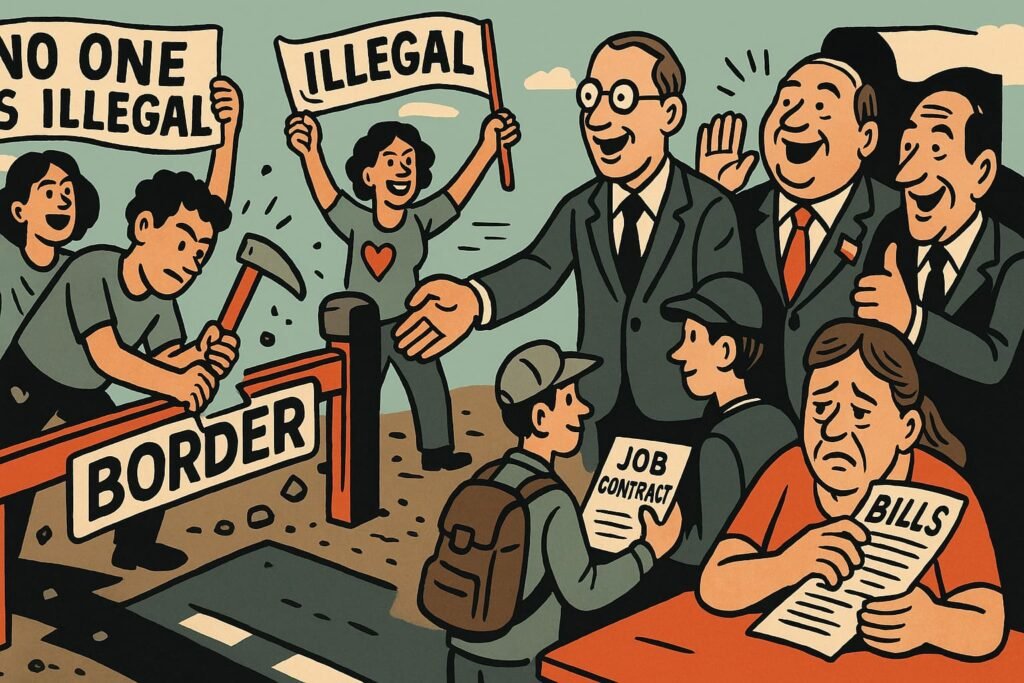Critical Migration Studies – When Borders Become Oppression
Migration Studies is the broad, neutral field that looks at how and why people move across borders. Economics, demography, integration — the practical stuff.
Critical Migration Studies (CMS) is the activist-academic wing. It applies the Critical Theory lens: borders are oppressive, citizenship is privilege, and migration is a human right.
The promise was compassion. The result? A worldview where controlling borders is immoral and disagreeing is bigotry.
Table of contents
What Is Critical Migration Studies?
In plain terms, CMS argues:
- Borders are unjust barriers that exclude and oppress.
- Citizenship is an inherited form of privilege.
- Migrants aren’t just movers — they’re justice figures, symbols of resistance.
- States must adapt, regardless of costs or consequences.
In short: migration isn’t policy, it’s morality — and opposing it makes you the oppressor.
Buzzwords of Critical Migration Studies
Like other Critical Theory offshoots, CMS has its own dictionary:
- Refugee Justice – Migration as a human right.
- Fortress Europe / America – Borders described as violent, exclusionary walls.
- No One Is Illegal – Citizenship laws reframed as injustice.
- Sanctuary – Safe zones declared above national law.
These slogans recast national borders as acts of oppression.
How CMS Shows Up in Practice
- In Politics: Pushes for open borders, amnesties, and sanctuary cities.
- In Activism: Deportations framed as human rights abuses.
- In Media: Migration stories told as morality tales, not policy debates.
- In Corporations: Multinationals brand themselves pro-migrant while lobbying for cheap labour.
What began in academia now drives protests, policy shifts, and corporate PR.
Why Institutions Promote CMS
- Academics: Endless careers writing about borders as violence.
- Activists: A permanent outrage machine.
- Corporations: Cheaper labour and a progressive image at once.
- Politicians: Easy virtue points, funded by guilt-based narratives.
As usual, elites profit most. Migrants and citizens bear the costs.
The Consequences of CMS Thinking
- Sovereignty Undermined: Borders cast as immoral, not practical.
- Economic Strain: Pressure on housing, welfare, and services ignored.
- One-Sided Morality: Host nations always oppressors, migrants always victims.
- Permanent Crisis: If borders are always unjust, the debate never ends.
The irony? A theory designed to empower migrants often traps them in limbo, while elites build careers managing the outrage.
Why It Matters
Critical Migration Studies isn’t just an academic debate. It shapes activism, media, and policy across the West. By recasting borders as oppression, it guarantees endless guilt politics — but rarely delivers workable solutions.
From Borders to Outrage
CMS took migration out of the realm of policy and into permanent morality politics. Borders became villains, activists became heroes, and governments were told to bend.
The fight for fairness became an industry of grievance.
For a deeper understanding of Critical Theory, check out our Critical Theory Explainer Hub.
FAQ: Critical Migration Studies
What is Critical Migration Studies in simple terms?
It’s the activist approach that reframes borders and citizenship as oppression, and migration as a right.
How is it different from Migration Studies?
Migration Studies is neutral and empirical. Critical Migration Studies is ideological, rooted in Critical Theory.
Why is CMS controversial?
Because it undermines sovereignty, downplays economic costs, and treats disagreement as oppression.
How does CMS affect society?
It drives activism, sanctuary policies, and corporate branding around migration.
What’s the danger of CMS?
That it fuels permanent outrage and instability, benefiting elites more than migrants.



